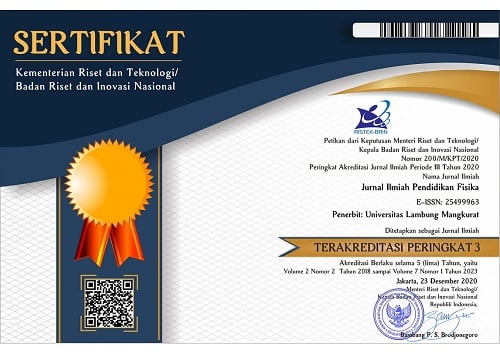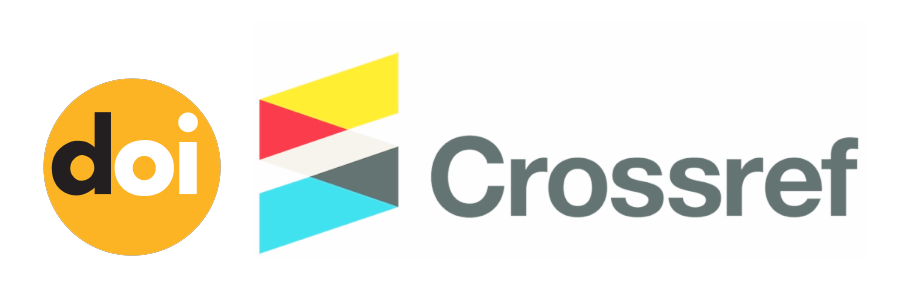The Influence of Cooperative Learning Model Type Group Investigation Toward Results of Learning Science Materials of Students
Abstract
Student learning outcomes are still low due to the use of learning models that are less varied. Therefore, researchers apply the cooperative learning model type group investigation in learning science. This study aims to describe the influence of the cooperative learning model type group investigation on the learning outcomes of science materials in the fifth grade students of SDN 1 Banjarejo. This type of research used is quasi-experimental design with nonequivalent control group design. The sample of this research is the VB class SDN 1 Banjarejo experimental class and class V SDN 1 Banjarejo as the control class. Data collection techniques for learning outcomes use multiple choice tests and descriptions. Learning outcomes data were analyzed by independent t-test and gain test. The results of the analysis of the pretest data showed that there was no difference in the average pretest score between the two samples. The results of posttest data analysis showed that there were differences in the average posttest scores of the experimental and control classes, with the difference in the average experimental class being higher at 5.50. Large increase in the average normalized gain in the experimental class by 0.41 (medium), while in the control class by 0.29 (low). These results provide the conclusion that the cooperative learning model type group investigation has a significant and positive influence on science learning outcomes in elementary students.
Keywords
Full Text:
PDFReferences
Aditya, R. R. C. (2016). Peningkatan aktivitas dan hasil belajar ipa melalui model pembelajaran kooperatif tipe group investigation pada siswa kelas v SD Negeri 1 Sungapan. Basic Education, 5(38).
Almuniar, A., Syamsiati, S., & Uliyanti, E. (2015). Peningkatan hasil belajar siswa pada pembelajaran ipa model kooperatif group investigation di sekolah dasar. Jurnal Pendidikan Dan Pembelajaran Untan, 4(12).
Ariadi, I. P., Renda, N. T., & Rati, N. W. (2014). Pengaruh Model pembelajaran group investigation (gi) terhadap hasil belajar ipa kelas iv. Mimbar PGSD Undiksha, 2(1).
Ariawan, K. D., Jampel, I. N., & Rati, N. W. (2016). Pengaruh model pembelajaran kooperatif tipe group investigation berbasis media lingkungan terhadap hasil belajar ipa siswa kelas iv di Desa Sidetapa Tahun Pelajaran 2014/2015. MIMBAR PGSD Undiksha, 4(1).
Budiastra, I. K., Sudana, D. N., & Arcana, I. N. (2015). Pengaruh model kooperatif gi (group investigation) terhadap keterampilan berpikir kritis dalam pembelajaran ipa. Mimbar Pgsd Undiksha, 3(1).
Christina, L. V, & Kristin, F. (2016). Efektivitas model pembelajaran tipe group investigation (gi) dan cooperative integrated reading and composition (circ) dalam meningkatkan kreativitas berpikir kritis dan hasil belajar ips siswa kelas 4. Scholaria: Jurnal Pendidikan Dan Kebudayaan, 6(3).
Dewi, P. P. Y., Manuaba, I. S., & Suniasih, N. W. (2018). Pengaruh model pembelajaran group investigation berbasis proyek terhadap hasil belajar ipa siswa kelas iv. International Journal of Elementary Education, 1(4).
Hake, R. R. (1998). Interactive-engagement versus traditional methods: a six-thousand-student survey of mechanics test data for introductory physics courses. American Journal of Physics, 66, 1–27.
Huda, M. (2014). Model-Model Pengajaran dan Pembelajaran. Yogyakarta: Pustaka Pelajar.
Muliyantini, P., & Parmiti, D. P. (2017). Penerapan model pembelajaran group investigation (gi) untuk meningkatkan hasil belajar ipa kelas v. Jurnal Ilmiah Sekolah Dasar, 1(2).
Murniati, & Barokah. (2017). Keefektivan penerapan model group investigation dengan strategi question student have pada mata kuliah mekanika di Program Studi Pendidikan Fisika Fkip Unsri. Berkala Ilmiah Pendidikan Fisika, 5(3).
Purnamasari, U. A., Arifuddin, M., & Hartini, S. (2018). Meningkatkan aktivitas belajar siswa pada mata pelajaran ipa dengan model pembelajaran kooperatif tipe group investigation. Berkala Ilmiah Pendidikan Fisika, 6(1).
Rizal, M. (2014). Pengaruh pembelajaran inkuiri terbimbing dengan multi representasi terhadap keterampilan proses sains dan penguasaan konsep IPA siswa SMP. Jurnal Pendidikan Sains, 2(3).
Sugiyono. (2010). Metode penelitian kuantitatif, kualitatif dan R & D. Bandung: Alfabeta.
Sugiyono. (2012). Statistika Untuk Penelitian. Bandung: Alfabeta.
Sundayana, R. (2013). Statistika Penelitian Pendidikan. Garut: STKIP Garut Press.
Sutrini, N. N., Suarni, N. K., & Renda, N. T. (2013). Pengaruh model pembelajaran kooperatif tipe group investigation (gi) terhadap hasil belajar ipa siswa kelas V SD di Gugus 7 Tianyar. Mimbar PGSD Undiksha, 1(1).
Wardana, I. W. S., Setuti, N. M., & Sudatha, I. G. W. (2013). Pengaruh model pembelajaran group investigation berbantuan asesmen proyek terhadap prestasi belajar ipa siswa kelas V Sekolah Dasar Gugus III Tampaksiring. Mimbar PGSD Undiksha, 1(1).
Yamin, M. R., & Karmila, K. (2020). Analisis kebutuhan pengembangan media pembelajaran berbasis cartoon dalam pembelajaran ipa pada materi lingkungan kelas III SD. Biology Teaching and Learning, 2(2).
Yulismina, U., Warsiti, & Ngatman. (2013). Penerapan model pembelajaran kooperatif tipe group investigation (gi) untuk meningkatkan hasil belajar ipa siswa kelas iv sd. Kalam Cendekia PGSD Kebumen, 3(1).
Zainuddin, Z., Fitriani, F., & Misbah, M. (2017). Development of a senior high school on dynamic fluid learning material in the setting of group investigation type of cooperative learning. Prosiding Seminar Nasional Fisika (SNF), 109–116.
DOI: https://doi.org/10.20527/jipf.v4i1.1772
Refbacks
- There are currently no refbacks.
Indexed by: Jurnal Ilmiah Pendidikan Fisika is licensed under a creative commons attribution-share alike 4.0 international license
Statistics Counter |
















